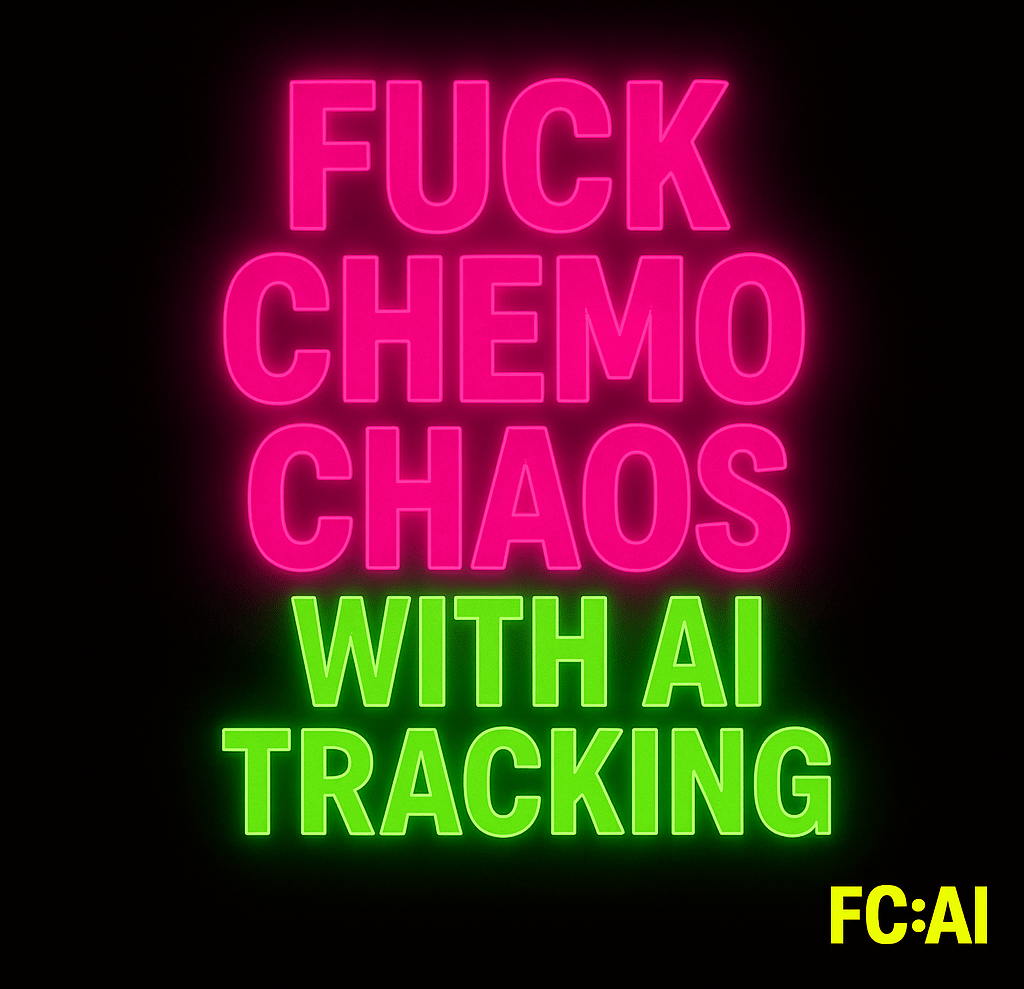FC:AI: The Protocol (part 1): Setting Up AI Chemo Tracking
Chemo chaos meets clarity. Here’s how I used Manus AI, WHOOP, and a custom ChatGPT to track every cycle of treatment - and why it changed everything.
FC:AI TOOLS AND TIPS
Russ Read-Barrow
7/24/20255 min read


Right. Let's get one thing straight from the start. This isn't some inspirational BS about "fighting the good fight" or being a "cancer warrior." I'm just a 42 (43?! can't remember)-year-old bloke, with Stage 4 colorectal cancer, with two kids who need their dad around.
What this is about is getting practical. It's about using AI to track what actually matters during chemotherapy so you can make better decisions instead of just hoping for the best.
Because here's the thing about cancer treatment: it's chaos. Your body does weird shit at random times. Side effects hit when you least expect them. Energy levels bounce around like a drunk person on a trampoline. And the medical team, bless them, can only tell you what "usually" happens to "most people."
But you're not most people. You're you. And if you're going to get through six cycles of FOLFIRI plus Cetuximab without losing your mind, you need data. Your data.
Why I Started Tracking (Spoiler: Previous Chemo Was Shit)
This wasn't my first rodeo with chemotherapy. I'd done it before, and it was absolutely fucking awful. Not because the treatment didn't work (though tbh I'm not sure it did...). But because I had no idea what was coming, when it was coming, or what I could do about it.
I'd wake up feeling like I'd been hit by a truck and have no clue if this was normal Day 3 stuff or if something was actually wrong. I'd feel great one morning and plan a full day, only to crash by lunchtime. I'd try interventions - different foods, supplements, exercise timing - but never tracked whether they actually helped.
It was like trying to navigate in the dark while someone occasionally shouts unhelpful directions from another room.
So when the oncologist told me we were doing another six cycles (this time with a different drug cocktail), I made a decision. This time, I was going to track everything. Not just the obvious stuff like nausea and fatigue, but the patterns. The correlations. The things that actually matter for making day-to-day decisions.
And I was going to use AI to help me make sense of it all.
Enter Manus AI: My New Tracking Partner
I'd been playing around with Manus AI for work stuff, and it struck me that this could be perfect for designing a tracking protocol. Not just any tracking - smart tracking. The kind that would actually help me optimize my experience instead of just documenting my misery.
The first conversation with Manus was simple: "I need to track my chemotherapy experience in a way that helps me make better decisions. What should I be measuring?"
What came back wasn't just a list of symptoms to rate from 1-10. It was a proper framework. Morning and evening check-ins. Physiological metrics. Intervention tracking. Pattern recognition. The works.
But here's what made it brilliant: Manus understood that I needed this to be sustainable. No point designing some elaborate tracking system that I'd abandon by Day 3 when the chemo brain kicked in.
The Metrics That Actually Matter
After a few iterations with Manus, we settled on a tracking protocol that covered the essentials without being overwhelming:
Morning Check-In (5 minutes max):
•Overall wellbeing (1-10)
•Energy level (1-10)
•Fatigue (1-10)
•Mental clarity (1-10)
•Mood (1-10)
•Any specific symptoms (nausea, pain, neuropathy, skin issues)
•Sleep quality from the night before
•Planned activities for the day
Evening Check-In (5 minutes max):
•Same wellbeing metrics as morning
•How the day actually went vs. plans
•Any interventions tried (supplements, exercise, rest, food changes)
•Notes on what worked or didn't work
•Preparation for tomorrow
WHOOP Integration: This was the game-changer. My WHOOP was already tracking sleep, heart rate variability, recovery scores, and strain. Instead of ignoring this goldmine of physiological data, we integrated it into the daily check-ins.
Every morning, I'd note my WHOOP recovery score alongside my subjective energy levels. Over time, this would show whether my body's objective measurements matched how I actually felt - and when they didn't, that was usually a warning sign.
The Technical Setup (Simpler Than You Think)
The beauty of this system was its simplicity. No fancy apps. No complicated spreadsheets. Just a custom ChatGPT that Manus helped me design, loaded with my specific treatment protocol and tracking framework.
Every morning and evening, I'd have a conversation with this custom GPT. It would ask the right questions, record my responses, and start identifying patterns. When I uploaded my WHOOP data, it would correlate my subjective experience with objective physiological metrics.
The ChatGPT became like having a research assistant who never forgot anything and could spot patterns I'd miss. "Your energy crashes seem to correlate with poor REM sleep two nights prior," it would note. Or "You consistently feel better on days when you take magnesium with dinner."
Integration with Daily Life
The key was making this feel natural, not like homework. The morning check-in became part of my coffee routine. Two minutes while the kettle boiled. The evening check-in happened just after dinner / while I wsa generally lying in bed / on the sofa / anywhere.
I used voice-to-text for most entries because typing on a phone when you're knackered is a pain in the arse. The custom ChatGPT was trained to understand my conversational style, so I could just talk to it like I was updating a mate.
"Feeling pretty rough this morning. Energy about a 4. Slept like shit—kept waking up. WHOOP says 34% recovery which sounds about right. Planning to take it easy today, maybe just a gentle walk if I feel up to it later."
The AI would parse this, extract the key metrics, and file it away for pattern analysis.
The Emotional Impact of Having Data
Here's something I didn't expect: having data made the uncertainty bearable.
When you're going through chemo, you're constantly wondering if what you're experiencing is normal, if it's getting worse, if the treatment is working. Your brain, especially when it's foggy from treatment, isn't great at remembering how you felt three days ago, let alone three weeks ago.
But the data remembered everything. When I was having a particularly shit day in Cycle 2, I could look back and see that I'd had similar days in Cycle 1, and they'd always improved by Day 6. When I tried a new supplement, I could track whether it actually made a difference or if I was just experiencing placebo effect.
Most importantly, I could see the overall trends. Even when individual days were rough, the data showed that I was generally managing better than the previous cycle. That's powerful stuff when you're in the middle of treatment and everything feels chaotic.
What I Wish I'd Known Before Starting
Start simple. My first attempt at tracking was way too complicated. Manus helped me strip it back to what actually mattered.
Voice notes are your friend. When you're tired, talking is easier than typing. Train your AI to understand your speaking style.
Don't track everything. It's tempting to measure every possible variable, but you'll burn out. Focus on the metrics that help you make decisions.
Integrate with existing habits. Don't create new routines from scratch. Attach tracking to things you already do daily.
Trust the process. The patterns won't be obvious immediately. Give it at least 2 weeks before you start drawing conclusions.
The Foundation for Everything That Followed
This tracking protocol became the foundation for everything that came next. The pattern recognition. The intervention optimization. The ability to predict and prevent problems instead of just reacting to them.
But I'm getting ahead of myself. That's for the next post.
For now, the key thing is this: if you're facing chemotherapy, you don't have to just endure it blindly. You can track it, understand it, and optimize it. The tools exist. The technology works. You just need to set it up properly.
And if a knackered bloke with chemo brain can do it, so can you.
Next week: "The Process: Daily Life with AI Tracking" - What it actually looked like to maintain this system when I could barely remember my own name
FC:AI
© 2025 FC:AI. Built with zero bullshit during chemo.
All content © FC:AI unless otherwise credited.
